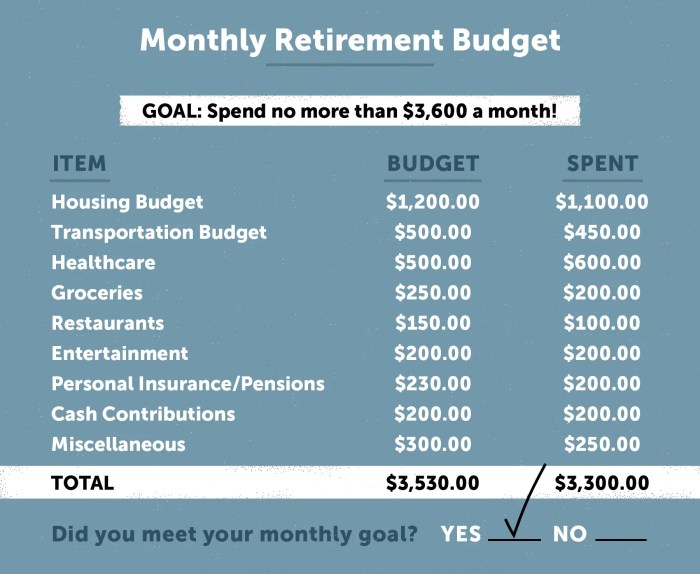Diving into the world of Financial goals for retirement, this introduction sets the stage for a dynamic exploration of how crucial it is to plan your financial future. We’re about to break down the importance of financial goals and how they can pave the way for a secure retirement.
From short-term aspirations to long-term financial objectives, we’re going to delve into the nitty-gritty details of setting achievable goals that align with your retirement dreams. So buckle up and get ready to take charge of your financial destiny!
Importance of Financial Goals for Retirement
Setting specific financial goals for retirement is crucial for ensuring a secure and comfortable future. Without clear goals in place, it can be challenging to determine how much money you will need to retire and how to achieve that target.
Benefits of Having Clear Financial Goals for Retirement
- Helps in determining the amount needed: By setting financial goals, you can calculate how much money you will need to live comfortably during retirement.
- Provides motivation and direction: Having clear goals gives you a sense of purpose and direction in your retirement planning journey.
- Allows for better decision-making: Financial goals help in making informed decisions about savings, investments, and expenses to meet your retirement objectives.
How Financial Goals Can Provide a Roadmap for Retirement Planning
“A goal without a plan is just a wish.”
Setting financial goals acts as a roadmap for retirement planning by outlining specific targets to achieve. It helps you prioritize your financial decisions, track your progress, and make adjustments along the way to stay on course towards a secure retirement.
Types of Financial Goals for Retirement
When it comes to planning for retirement, individuals often have a variety of financial goals in mind. These goals can range from short-term objectives to long-term aspirations, all aimed at ensuring a secure and comfortable retirement. Setting achievable financial goals is crucial for building a solid financial foundation for the future.
Short-Term Financial Goals for Retirement
Short-term financial goals for retirement typically involve saving a certain amount of money within a specific timeframe. This could include building an emergency fund, paying off high-interest debt, or contributing to a retirement account on a regular basis. Achieving these short-term goals can provide a sense of accomplishment and lay the groundwork for long-term financial success.
Long-Term Financial Goals for Retirement
Long-term financial goals for retirement focus on building wealth over time to sustain a comfortable lifestyle during retirement years. These goals may include maximizing contributions to retirement accounts, investing in diversified assets, and creating a comprehensive retirement income plan. By setting and working towards long-term financial goals, individuals can secure their financial future and enjoy a worry-free retirement.
The Significance of Setting Achievable Financial Goals for Retirement
Setting achievable financial goals for retirement is essential for several reasons. It helps individuals create a roadmap for their financial future, track their progress, and make necessary adjustments along the way. By establishing clear and realistic goals, individuals can stay motivated, disciplined, and focused on building wealth for retirement. Additionally, setting achievable financial goals provides a sense of financial security and peace of mind, knowing that they are actively planning for a financially stable retirement.
Strategies for Setting Financial Goals for Retirement

Setting financial goals for retirement is crucial to ensure a comfortable and secure future. Here are some strategies to help you set realistic goals, consider important financial factors, and track your progress towards retirement:
Consider Inflation and Other Financial Factors
When setting financial goals for retirement, it is essential to take into account factors such as inflation, healthcare costs, and unexpected expenses. Inflation can erode the value of your savings over time, so it’s important to adjust your goals accordingly. Consider consulting with a financial advisor to understand how these factors can impact your retirement savings.
Tips for Setting Realistic Financial Goals
– Start by determining your desired retirement lifestyle and estimating your expenses.
– Set specific and measurable goals, such as saving a certain amount each month or increasing your retirement account contributions.
– Consider your current financial situation, including debts, savings, and investments, when setting goals.
– Be realistic about your retirement timeline and adjust your goals as needed based on changing circumstances.
Methods for Tracking Progress
– Regularly review your retirement accounts and investments to ensure they are aligned with your goals.
– Use financial planning tools or apps to track your progress towards your retirement goals.
– Consider meeting with a financial advisor periodically to assess your progress and make any necessary adjustments.
By following these strategies, you can set realistic financial goals for retirement, consider important financial factors, and track your progress towards a secure and comfortable retirement.
Adjusting Financial Goals for Retirement
Adjusting financial goals for retirement is crucial to ensure that your plans remain realistic and achievable as circumstances change over time. Periodically reviewing and modifying your financial goals will help you stay on track towards a comfortable retirement.
Life Changes Necessitating Adjustments
- Health Issues: Unexpected medical expenses may arise, requiring a reassessment of your savings goals.
- Job Loss or Career Change: Changes in employment status can impact your income and retirement timeline.
- Family Responsibilities: Supporting children or aging parents may alter your financial priorities.
Strategies for Modifying Financial Goals
- Regular Assessment: Schedule annual reviews to evaluate your progress and make necessary adjustments.
- Reassess Risk Tolerance: Consider adjusting your investment strategy based on your changing risk tolerance and retirement timeline.
- Seek Professional Advice: Consult a financial advisor to help you recalibrate your goals in response to life changes.
